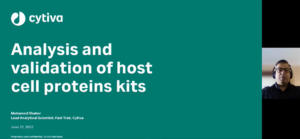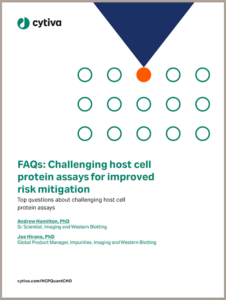- Sponsored Content
- Process Development
Host Cell Proteins — Bench to Production SolutionsHost Cell Proteins — Bench to Production Solutions
January 23, 2023

Want to continue viewing?
Complete activation for full access.
Already have an account?
Sponsored by Cytiva
Enzyme-linked immunosorbent assays (ELISA) are commonly used in analytical chemistry. They can be used in process development for biologic therapies to detect and quantitate host cell protein (HCP) contamination. HCP can cause immunogenic responses in patients and reduce efficacy of these therapies and therefore must be removed to meet regulatory requirements.
Some challenges you may run into when utilizing ELISAs are how to prepare your samples, choosing the best generic/commercial ELISA for your needs, and ensuring security of supply for these assays.
Explore the comprehensive ELISA resources below for further information.

Mohamed Shaker, Lead Scientist, Analytical Development, Cytiva.
How to Select and Validate Host Cell Proteins for Process Development
Off-the-shelf generic and commercial CHO HCP ELISAs are commonly used to quantitate HCP in early process development. However, it’s challenging to find and choose a generic ELISA suited to a process. Here we share a case study on selection criteria and validation of a generic ELISA for process development.
Learning objectives:
Gain access to practical guidance and an intuitive understanding of how to establish a generic CHO HCP ELISA for your process development.
Learn how to compare generic ELISA kits in terms of specificity, sensitivity, reproducibility, robustness, coverage, and process compatibility.
Speaker:
Mohamed Shaker, Lead Scientist, Analytical Development, Cytiva.
Mohamed Shaker is a lead analytical development scientist for the Fast Trak™ team at Cytiva and is based in Marlborough, MA, USA. Mohamed has 13 years of biopharma experience spanning upstream (including perfusion and transfections), downstream chromatography, and analytical method qualification and validation. He is experienced in the characterization of enzyme replacement therapy, biosimilars, mAbs and biopharmaceutical protein by performing HPLC, UPLC, glycan mapping, Poros, HIC, CEX, SDS-PAGE, Western blots, IEF, ELISA and Biacore™ analyses. He has also developed various HPLC methods for multi-molecule product characterization. Mohamed holds a bachelor’s degree in chemistry and biology.

Joe Hirano, PhD, Imaging and Western Blotting Program Manager, Cytiva & David Chimento, PhD, Vice President, Custom Services Division, Rockland Immunochemicals.
Security of Supply for Critical Reagents Used in HCP Analysis
The most common method scientists use to monitor host cell protein (HCP) levels in biologics is the enzyme-linked immunosorbent assay (ELISA). For the reagent, security of supply is a regulatory requirement — it’s a factor that’s critical to consistently monitoring HCP during biologic production. In this webinar, we discuss why security of supply is important, the consequences of not having it, and how to mitigate this risk.
Learning Objectives:
Why security of supply is critical to your HCP plans.
Consequences of not securing supply upfront.
How to mitigate risk by securing supply distribution.
Differences between antisera batch and ELISA lot.
Speakers:
Joe Hirano, PhD is the Imaging and Western Blotting Program Manager at Cytiva, based in Uppsala, Sweden. He manages products and their applications between research and development, and external collaborators to support customers. Since joining the company in 2000, Joe has been working with genomics, protein research, and biomanufacturing products, including electrophoresis, western blotting, imaging, and upstream and downstream bioprocess products.
David Chimento, PhD, is the Vice President of the Custom Services Division at Rockland Immunochemicals, based in Limerick, Pennsylvania, US. David coordinates and oversees research and development engagements for both internal and external stakeholders with a focus on project design and strategy for customers. David joined Rockland Immunochemicals in 2008 and has been working on critical reagent development and assay development. He has a strong interest in creating tools for traditional and emerging biotherapeutics and biomanufacturing.
 FAQs: Challenging Host Cell Protein Assays for Improved Risk Mitigation
FAQs: Challenging Host Cell Protein Assays for Improved Risk Mitigation
At high levels, host cell proteins (HCPs) can cause immunogenic responses and reduced efficacy of biologics, so it is imperative to have an effective, robust HCP assay to detect them and mitigate these effects. Challenging your HCP assay can improve risk mitigation and strengthen your HCP control strategy.
Download this white paper to discover answers to questions such as:
What is the major challenge of developing a generic HCP ELISA?
Some HCPs are known to bind mAbs. How can we detect these HCPs using ELISA?
What is a good target level of the final concentration of HCP?
Future-Proof Your HCP Strategy
Is your HCP strategy ready to provide you with the results you need? From sample preparation to data analysis, each step affects the next—and ultimately, your results. Answer four questions to help you decide if your HCP analysis data is accurate, robust, and ready for next phase approval.
Confidence in Host Cell Protein (HCP) Coverage Assays With Differential Gel Approaches
Enzyme-linked immunosorbent assays (ELISAs) are critical to detecting and removing host cell proteins (HCPs), a primary source of impurities in biologics development. Scientists must validate HCP ELISAs to ensure patient safety and meet regulatory guidelines – but different coverage assays come with different challenges, limitations, and benefits. The US Pharmacopeia recommends 2D differential gel electrophoresis (DIGE) combined with Western blot or immunoaffinity approaches, and labs might not be able to gain the full benefits of DIGE without significantly altering current procedures. Understanding the options available can help scientists implement a coverage strategy that optimizes accuracy and minimizes the risk of delay in the biologic approval process.
This visual guide summarizes the steps involved in differential gel approaches and immunodetections, outlines their strengths and weaknesses, and compares the level of confidence they can provide to your processes. A clear and comprehensive view of the facts can help you make an informed decision to enhance speed and accuracy throughout biologics development and manufacture.
Thank you for your interest in Cytiva's host cell protein related content. Please submit the form and you will receive an email containing a link to each of the webinars/white paper/infographics that you requested.
About the Author
You May Also Like





